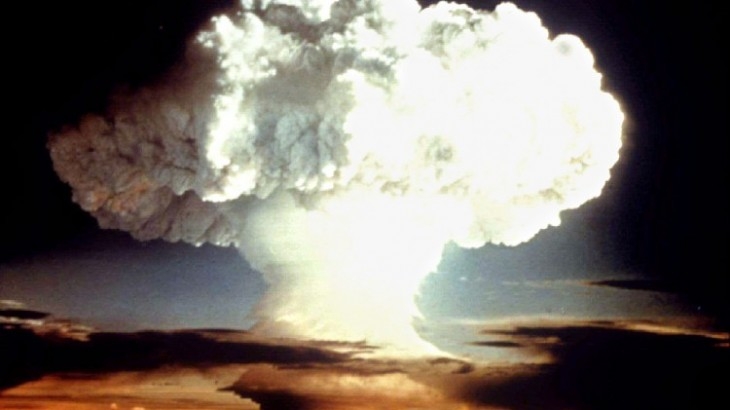The Treaty on the Prohibition of Nuclear Weapons, first adopted by the UN General Assembly in July 2017, will enter into force on 22 January, after the 50th signatory deposited its ratification of the treaty with the United Nations. Nauru became the 49th country to ratify the treaty on 23 October, followed by Honduras the following day.
UN Secretary General Antonio Guterres called the disarmament treaty “a very welcome initiative”, noting that the 50th ratification came on the very day that marked the 75th anniversary of the ratification of the UN Charter.
Ten of the first 50 treaty ratifications or accessions came from members of the Pacific Islands Forum: New Zealand, Vanuatu, Fiji, Kiribati, Nauru, Tuvalu, Samoa, Palau, Cook Islands, and Niue. There are ten reasons why these ten Pacific countries support the treaty: Bikini, Enewetak, Monte Bello, Maralinga, Emu Field, Johnston, Malden, Christmas, Moruroa, Fangataufa.
Civil society groups, including the Red Cross / Red Crescent movement and the International Campaign to Abolish Nuclear Weapons (ICAN) – winner of the 2017 Nobel Peace Prize – drove the campaign for ratification, with nuclear survivors from the Pacific playing a key role.
Unlike arms control agreements, which seek to limit the size of nuclear arsenals, the TPNW is the first treaty to comprehensively ban nuclear weapons and provide a pathway for all nations to outlaw and eliminate nuclear weapons. ICAN Executive Director Beatrice Fihn said: “It is a crucial piece of international law that puts nuclear weapons in the same illegal category as biological weapons, chemical weapons, anti-personnel landmines and cluster munitions.”
The treaty prohibits countries from “developing, testing, producing, manufacturing, transferring, possessing, stockpiling, using or threatening to use nuclear weapons”. While no nuclear-armed state is likely to sign the Treaty soon, it establishes important international law that will constrain the deployment of nuclear weapons. TPNW prohibits non-nuclear weapon states from allowing nuclear weapons to be stationed on their territory. It also prohibits them from “assisting, encouraging or inducing” anyone to engage in any of these activities, which is important for states like New Zealand that are allies of nuclear-armed powers like the United States.
In a last, desperate move to scuttle the treaty, the Trump administration wrote to governments last month, asking them to reverse their ratifications. The news agency Associated Press reported on the letter sent from the US government to treaty signatories, which stated: “Although we recognise your sovereign right to ratify or accede to the Treaty on the Prohibition of Nuclear Weapons (TPNW), we believe that you have made a strategic error and should withdraw your instrument of ratification or accession.”
Regional ratifications
Despite historic support for nuclear disarmament, Papua New Guinea, Solomon Islands, Tonga, RMI and FSM are yet to sign or ratify the Treaty. As French colonies, New Caledonia and French Polynesia do not have the international standing to sign, even though France conducted 193 nuclear tests at Moruroa and Fangataufa atolls and thousands of Maohi workers and neighbouring communities suffered significant health impacts.
Unlike its ANZUS ally New Zealand, the Australian government has refused to sign or ratify the Treaty. As the TPNW was negotiated, the Australian government expressed concern it may undercut the Nuclear Non-Proliferation Treaty (NPT), preferring verifiable, step-by-step measures rather than a total ban on nuclear weapons. However none of the declared nuclear-armed states are engaged in negotiations for comprehensive nuclear disarmament, despite their obligation to do so under Article 6 of the NPT.
As the TPNW was first adopted in 2017, John Carlson – the former Director General of the Australian Safeguards and Non-Proliferation Office – acknowledged: “Extolling a ‘step-by-step’ approach to disarmament lacks credibility when there are no such steps under way, or even being contemplated.”
Assistance to survivors
The TPNW includes unprecedented provisions in a disarmament treaty, requiring parties to assist nuclear survivors. These are vital clauses for the Pacific region, where tens of thousands of civilian and military personnel participated in nuclear testing programs in Marshall Islands, Australia, Kiribati and French Polynesia. The treaty also sets out obligations for states to take “necessary or appropriate measures” to remediate environments contaminated by nuclear weapons testing.
In December 2018, NZ Prime Minister Jacinda Ardern hosted a meeting of Pacific island states in Auckland, to discuss advancing the TPNW in the region. This process is likely to continue after the recent election victory of NZ Labour.
At last year’s Pacific Islands Forum in Tuvalu, leaders “acknowledged the importance of addressing the long-standing issues of nuclear testing legacy in the Pacific.” They directed the Forum Secretariat to work with other agencies in the Council of Regional Organisations of the Pacific (CROP), to address the ongoing impacts of nuclear testing on human rights, health and environmental contamination. A CROP Taskforce on Nuclear Legacy Issues has now been established, to begin evaluating the legacies of more than 310 nuclear tests across the region.
